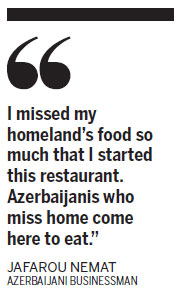'Beijing-Istan' taking shape
 |
|
It's show time at the Mango, one of several Russian restaurants in Yabaolu. [Photo by Wang Jing/China Daily] |
The presence of people from other Soviet republics is becoming more conspicuous as eateries serving cuisines from Kazakhstan, Uzbekistan, Georgia and Azerbaijan behind the fur market have roughly tripled to about half a dozen in the past year. There were none in the area two years ago.
"Yabaolu is more of a Russian-speaking area, not a Russian area," says Kachalova.
And residents anticipate an influx from countries along the "New Silk Road Economic Belt" proposed by President Xi Jinping that's expected to encompass more than 40 Asian and European countries - including the entire former USSR - which are home to about 3 billion people.
"This will be good for business," says 34-year-old Azerbaijani Asim Alishov, who opened Caspi restaurant on the pedestrian street two months ago.
"The more people who come here, especially from Soviet countries, the better for us."
Alishov, who worked in logistics, lived in Yabaolu for 12 years before deciding to open his restaurant, since the local export business is shrinking.
He points out that Azerbaijani fare is, for historical reasons, much loved among Soviet countries, although its global acclaim has been eclipsed by Turkish food - a similar yet distinct cuisine - outside the former USSR.
Jafarou Nemat, 34, who owns the nearby Azerbaijani, Russian and Georgian restaurant Kavkaz, says: "A growing number of people know this area has Soviet style, even though the countries all have unique cultures. In the coming years, this area will have 100 eateries. It will be like Sanlitun (Beijing's embassy area) but for Soviets."
Uzbek Dilshodbek Bakiev is also hopeful about the prospects of more people from Soviet republics coming to Yabaolu.
The 35-year-old believes the New Silk Road Economic Belt will mean more Central Asians will come to Yabaolu and his restaurant. He was excited his country's president visited China this month.
"It's business. China wants to sell. Foreigners want to buy," he says. "As the trade volume (grows), more foreigners will move (to Yabaolu)."
He says he doesn't worry about whether that might mean more competition for his Uzbek diner Minaret, which opened two months ago next to what's billed as Beijing's only Kazakh eatery, Astana.
Related: Restrictions hurting Yabaolu

















